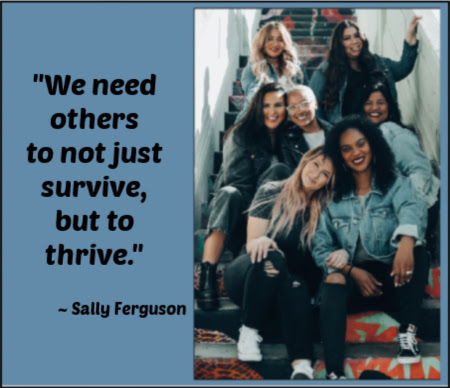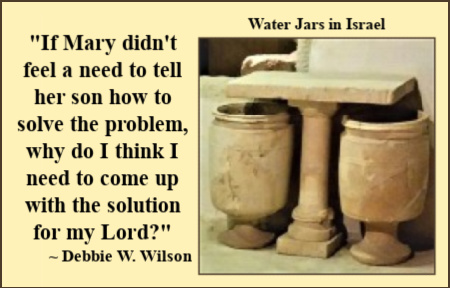Give Me My Delight
Susan K. Stewart is an analytical woman, so it doesn't surprise me she took time to think through why she felt so aimless. In this Relationship with God UPGRADE, she shares how she learned to delight in the Lord, and how that helped her learn to walk closer to His will.
"I’ve been wandering aimlessly recently. So many good projects, so many good causes, so many good books." Susan says. "While wandering I’ve been unsettled—feeling as though no matter the way I decide to go, I only get to a roadblock."
I (Dawn) think all Christ-followers feel a little aimless and unsettled sometimes. In my experience, I've usually tried to fill those times with busyness, but I never felt satisfied. As Susan explains, there's something far deeper I needed, and perhaps you do too.
Susan continues . . .
Often, I find myself just sitting in the path crying, "God, what is it You want me to do?"
Too often, my cry is, "Lord, You promised to give me the desires of my heart."
But, is that really what He promises?
Most of us are familiar with this "promise" in Psalm 37:4–5:
Delight yourself in the Lord, and he will give you the desires of your heart. Commit your way to the Lord; trust in him, and he will act.
Oh, so many times I'm guilty of telling God what I want—the plans I have—and then waiting for Him to fulfill those plans.
Once He's done his part, I'll do my part: delight in Him.
- When I look back at my journal, I find I ask God to be the center of what I do.
- I see now why I wander aimlessly. I need to be at the center of what he is doing.
That does sound very spiritual and heaven-minded, but how does being at the center of what God's desires look every day? I’m not sure it means quietly meditating all day long or spending most of the day reading scripture.
If that is what God is leading you to do, go for it.
Those activities don't work well for my soul or, quite frankly, my pocketbook.
About two weeks into my search for God’s desire—for the way for me to delight myself in Him—I began to read once again St. Augustine’s Confessions.
Right there in the first book, first writing, was the answer.
"The thought of you [God] stirs him [humans] so deeply that he cannot be content unless he praises you, because you made us for yourself and our hearts find no peace until they rest in you."
This section is accompanied with Ps. 22:26:
“The afflicted shall eat and be satisfied; those who seek him shall praise the Lord! May your hearts live forever!” (emphasis added)
WHOA.
What does that say again? "Those who seek him will praise the Lord!"
If I’m to know God’s plans for me, the desires He puts in my heart, I must praise him.
I will find God in my praise.
According to Noah Webster in his 1828 Dictionary of American English, delight is "a high degree of pleasure, or satisfaction of mind; joy." He adds, "'Delight is a more permanent pleasure than joy, and not dependent on sudden excitement.' When we are told to delight ourselves in the Lord, it means, 'to have or take great pleasure; to be greatly pleased or rejoiced.'"
For some, this kind of delight does come with hours of long meditation or reading the Bible, or even retreating away from the everyday world.
I've learned delight is found in praising God, my Lord.
When I do that, I’m at the center of what He made me to do—worship Him. This delighting can take place anytime, anyplace.
I can tell you my path became clearer as to what project to go forward with, what to drop.
I can also tell you I have managed to leave the trail God so carefully marks for me.
How? I forgot to praise Him.
How easy it is.
I ended up where He didn’t want me to be. (I know, God. That's what You told me in the first place, right?)
Getting the reward of our desires is possible with a few steps. These aren’t always easy, but we can repeat them as often as needed.
1. Seek God.
We are told to "Seek first the kingdom of God and his righteousness, and all these things will be added to you" (Matthew 6:33).
We can’t receive from the Lord until we find Him, until we are where He is.
2. Love God.
"Love the Lord your God with all your heart and with all your soul and with all your mind" (Matthew 22:37).
Once we’ve found God, we fall in love with him. Our natural tendency is to want to please those we love.
3. Commit to God.
"Commit your way to the Lord; trust in him, and he will act" (Psalm 37:5).
For me this is pivotal.
When I trust God, and let him map the route, I don't have to wonder, "What next?"
4. Delight in God.
As stated in Psalm 37:4, above, delighting in the Lord is key to the fulfillment of desires.
5. Receive from God.
Too often we think the second half of the same verse means when we praise God enough, He’ll give us what we want.
I believe we're being told God will place a desire in our hearts to follow His lead, His plan.
Now that I'm seeking Him once again in my praise, the path is opening up.
I'm finding God's desires right where He left them for me—in praise.
Do you feel as though you’re wandering aimlessly? What do you need to do find God’s desires? How will you delight in the Lord?
 Susan K. Stewart is Managing Editor/Nonfiction with Elk Lake Publishing where she teaches, writes, and edits non-fiction. Susan’s passion is to inspire
Susan K. Stewart is Managing Editor/Nonfiction with Elk Lake Publishing where she teaches, writes, and edits non-fiction. Susan’s passion is to inspire  readers with practical, real-world solutions. Her books include Science in the Kitchen, Preschool: At What Cost?, Harried Homeschoolers Handbook, and the award-winning Formatting e-Books for Writers. Her latest book, Donkey Devos: Listening When God Speaks, is scheduled to be released spring 2021. You can learn more at her website.
readers with practical, real-world solutions. Her books include Science in the Kitchen, Preschool: At What Cost?, Harried Homeschoolers Handbook, and the award-winning Formatting e-Books for Writers. Her latest book, Donkey Devos: Listening When God Speaks, is scheduled to be released spring 2021. You can learn more at her website.
Graphic adapted, courtesy of Barbara Jackson at Pixabay.
 Post a Comment → Posted on
Post a Comment → Posted on  Thursday, May 13, 2021 at 11:10AM
Thursday, May 13, 2021 at 11:10AM  Aimlessness,
Aimlessness,  Commit to God,
Commit to God,  Delight,
Delight,  Delight in God,
Delight in God,  Delight in the Lord,
Delight in the Lord,  God's Desire,
God's Desire,  Love God,
Love God,  Praise God,
Praise God,  Receive from God,
Receive from God,  Seek God,
Seek God,  Susan K. Stewart,
Susan K. Stewart,  Upgrade with Dawn Upgrade Your Life
Upgrade with Dawn Upgrade Your Life  Praise God,
Praise God,  Relationship with God,
Relationship with God,  Spiritual Growth
Spiritual Growth 













